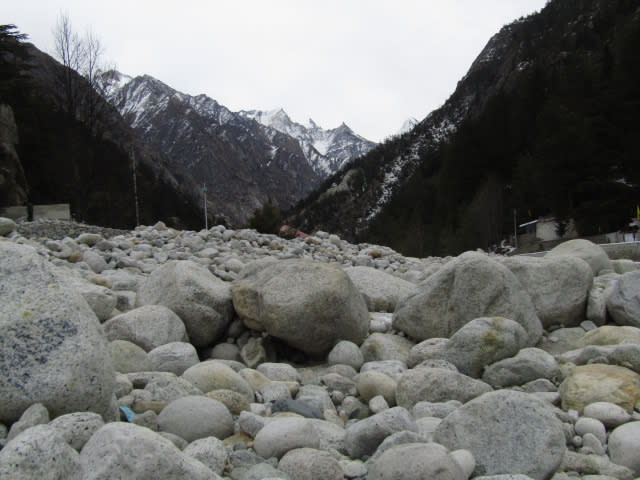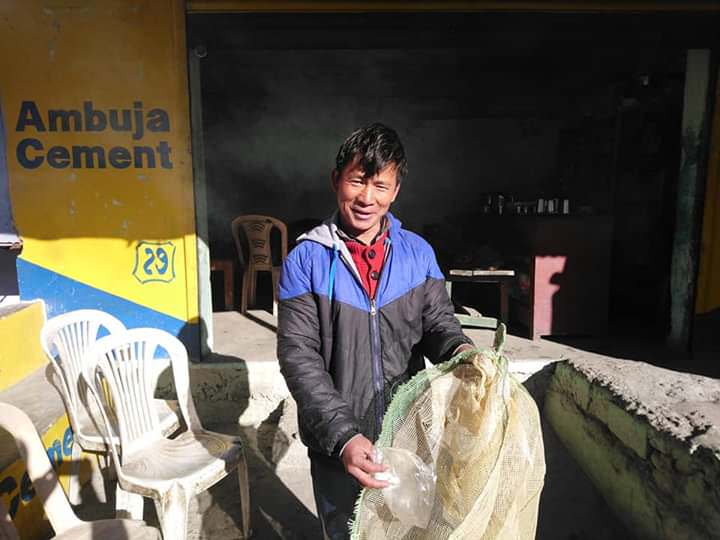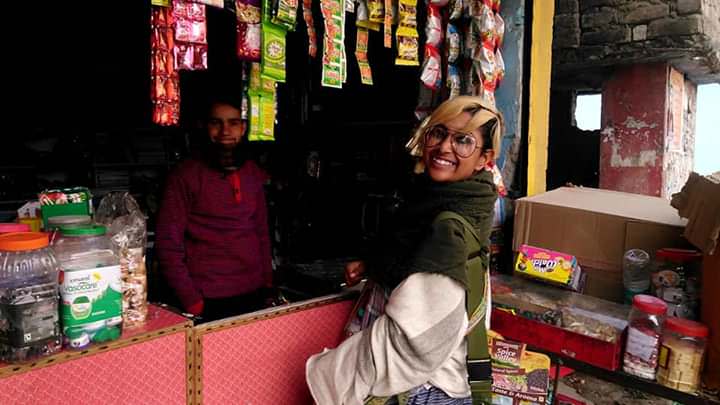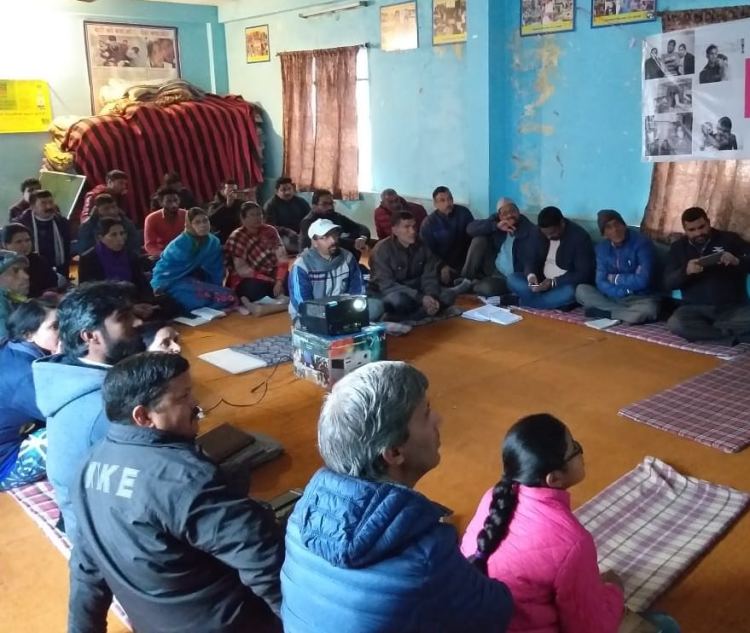With the transitional phase from dealing with waste management to resource management, I decided to start this new era of an age-old journey from Haridwar all the way to Gangotri and back. My gratitude to Alan Bywaters will remain etched forever for having helped me realize the difference between dealing with “waste” and dealing with “resources”. The idea behind this long, strenuous journey of 4 weeks was to stop at as many small hotels, eateries and grocery stores as possible along the Ganges, and talk to them about their plastic waste situation. So with a rucksack and tent, I started my walk and along the way, there were so many people I met and so many villages I crossed that I have lost count of both. 30 days of walking makes you a zombie at the last phase.

From where I started

For what I started this journey, Ganges
What I do remember is the context of the chilly winters of December 2018. To be elongated, my mission was to make the shopkeepers and small hotel owners understand the fact that what they consider to be a plastic waste is actually a valuable resource. How? Any form of plastic be it poly-metalized or clear plastic can be recycled and income can be generated from it. So what they would usually burn or dump and get nothing in return, could help them gain some amount of return. The crux with such community-based initiative lies in finding the right person at the right place.
 Right people of the community!
Right people of the community!
To make an assessment of how much waste is lying around in Gangotri, the origin of might Ganges, I decided to hitchhike from Haridwar all the way to the last point of vehicle access, Dharali. After sipping some hot tea in a tiny stall, I walked all the way to Gangotri halting once to pitch my tent. It was the coldest night of the year, the 25th of December. I have been to Gangotri during the tourist season and it was nothing like that this time. Apart from countable people who reside there in the Ashram, there was not a single soul. It had been snowing heavily during that time and people do not wish to trek during such weather. It did not take me much effort to convince an ex-doctor, popularly known as Doctor Maa, for a small place in her house for the night. The long discussion that night made me realize how much trouble the locals have after the tourists leave the place for the season. They do not have an option but burn all the plastic that is generated. Keeping this in mind I started walking down to Uttar Kashi which was about 2 and half weeks of a walk.

The coldest night of the year!

A different face of Gangotri-Silence!
These two weeks have been an eye-opener for me. I started my one on one awareness session from the very tea stall in Dhareli. All I explained to the man was how plastic can be recycled if segregated clean and dry at the source. I made him take a clean rice sack and pinned it right adjacent to the gas stove where he cooks.

My first food stall owner!
Mesmerized by the thought of having some benefit in return he arranged for a meeting with Gram Pradhan and a session with all the vital personnel of the village was held the next morning. In this session, it was decided that all the hotels and small stalls would start collecting their resources and the funding that Gram Panchayat gets from the District for community development would be used to set up a small waste segregation centre. Anyone dropping off a more than 2 bags of plastic in a month would be given free grocery worth the quantity.
 An excited Pradhan with far vision!
An excited Pradhan with far vision!
 Members of community association!
Members of community association!
For the next few days, I replicated this same process in almost 6 villages along the line of Ganges by incorporating the Gram Panchayat and the local of the community in place.
 Thanking the humble man for his time and attention!
Thanking the humble man for his time and attention!

When the word spreads!
On one such session, I happened to meet Kailash Ji, who is the head of Reliance Foundation Uttar Kashi. Being under the philanthropic segment of Reliance he was more than happy to collaborate with my idea of “wealth from waste” and the coming week we worked in collaboration. The better aspiration now was to use all the women who are under the Self Help Group to spread this word. The women were more than happy to undergo the training period with me and they incorporated their own concerns of motherhood and child safety into this model.

Kailash Gururani and his team for training on waste!
It was an honour to meet Pushpa Chauhan, the village head of Ganeshwari. She is a woman beyond vigour. I had heard about her on my way up to Gangotri and I made up my mind back then to get in touch with her. She did not think twice before arranging a huge gathering of all the women under her ward. In about three days they opened up a segregation unit. The glasses would be sent to the recycling centre at Uttar Kashi from which sand would be made and all the plastic would go to the main centre at Chandigarh where the District Magistrate had arranged for a recycling machine.

Pushpa Chauhan, Pradhan, Ganeshwari
 The SHG group and training on waste management!
The SHG group and training on waste management!
My motivation all the while were these thousands of small eateries and shops I visited until I reached Uttar Kashi, how people gathered around to at the least give me an ear, how few villages actually took a step to do something about their waste problem, how the younger children sit with me to watch videos on resource management and how the women of SHG tugged their will to give better health to their children.

A happy owner, a responsible citizen!

My rag picking brothers!

The seeders of tomorrow!
My meeting with the District Magistrate was equally successful and it made realize that of taken the right way, the Government bodies do come and support a rational cause. It is a long term goal that Uttar Kashi now has. The good part is that I was able to disperse the idea to the right people who are now carrying forward this job of making their district a better place to thrive in. Mr Pangal Pandey, a teacher, and Scouts Head is one such man who is now utilizing the power of children and youth to spread this word and set up a sustainable system in Uttar Kashi for maintaining their waste and converting it into a valuable resource. Along with him, there are other teachers of the few schools that Uttar Kashi have, who go for regular cleanups and collection of waste from the bigger stores present there.

Meeting with District Magistrate, Uttar Kashi

Mr Pangal Pandey and his force
This is a story whose end is yet to come. But it has been a beautiful beginning to a small ray of hope in this clouded sky of pollution and carbon that we dwell in.

What needs to be saved - The Ganges

From where I started

For what I started this journey, Ganges
What I do remember is the context of the chilly winters of December 2018. To be elongated, my mission was to make the shopkeepers and small hotel owners understand the fact that what they consider to be a plastic waste is actually a valuable resource. How? Any form of plastic be it poly-metalized or clear plastic can be recycled and income can be generated from it. So what they would usually burn or dump and get nothing in return, could help them gain some amount of return. The crux with such community-based initiative lies in finding the right person at the right place.
 Right people of the community!
Right people of the community!To make an assessment of how much waste is lying around in Gangotri, the origin of might Ganges, I decided to hitchhike from Haridwar all the way to the last point of vehicle access, Dharali. After sipping some hot tea in a tiny stall, I walked all the way to Gangotri halting once to pitch my tent. It was the coldest night of the year, the 25th of December. I have been to Gangotri during the tourist season and it was nothing like that this time. Apart from countable people who reside there in the Ashram, there was not a single soul. It had been snowing heavily during that time and people do not wish to trek during such weather. It did not take me much effort to convince an ex-doctor, popularly known as Doctor Maa, for a small place in her house for the night. The long discussion that night made me realize how much trouble the locals have after the tourists leave the place for the season. They do not have an option but burn all the plastic that is generated. Keeping this in mind I started walking down to Uttar Kashi which was about 2 and half weeks of a walk.

The coldest night of the year!

A different face of Gangotri-Silence!
These two weeks have been an eye-opener for me. I started my one on one awareness session from the very tea stall in Dhareli. All I explained to the man was how plastic can be recycled if segregated clean and dry at the source. I made him take a clean rice sack and pinned it right adjacent to the gas stove where he cooks.

My first food stall owner!
Mesmerized by the thought of having some benefit in return he arranged for a meeting with Gram Pradhan and a session with all the vital personnel of the village was held the next morning. In this session, it was decided that all the hotels and small stalls would start collecting their resources and the funding that Gram Panchayat gets from the District for community development would be used to set up a small waste segregation centre. Anyone dropping off a more than 2 bags of plastic in a month would be given free grocery worth the quantity.
 An excited Pradhan with far vision!
An excited Pradhan with far vision! Members of community association!
Members of community association!For the next few days, I replicated this same process in almost 6 villages along the line of Ganges by incorporating the Gram Panchayat and the local of the community in place.
 Thanking the humble man for his time and attention!
Thanking the humble man for his time and attention!
When the word spreads!
On one such session, I happened to meet Kailash Ji, who is the head of Reliance Foundation Uttar Kashi. Being under the philanthropic segment of Reliance he was more than happy to collaborate with my idea of “wealth from waste” and the coming week we worked in collaboration. The better aspiration now was to use all the women who are under the Self Help Group to spread this word. The women were more than happy to undergo the training period with me and they incorporated their own concerns of motherhood and child safety into this model.

Kailash Gururani and his team for training on waste!
It was an honour to meet Pushpa Chauhan, the village head of Ganeshwari. She is a woman beyond vigour. I had heard about her on my way up to Gangotri and I made up my mind back then to get in touch with her. She did not think twice before arranging a huge gathering of all the women under her ward. In about three days they opened up a segregation unit. The glasses would be sent to the recycling centre at Uttar Kashi from which sand would be made and all the plastic would go to the main centre at Chandigarh where the District Magistrate had arranged for a recycling machine.

Pushpa Chauhan, Pradhan, Ganeshwari
 The SHG group and training on waste management!
The SHG group and training on waste management!My motivation all the while were these thousands of small eateries and shops I visited until I reached Uttar Kashi, how people gathered around to at the least give me an ear, how few villages actually took a step to do something about their waste problem, how the younger children sit with me to watch videos on resource management and how the women of SHG tugged their will to give better health to their children.

A happy owner, a responsible citizen!

My rag picking brothers!

The seeders of tomorrow!
My meeting with the District Magistrate was equally successful and it made realize that of taken the right way, the Government bodies do come and support a rational cause. It is a long term goal that Uttar Kashi now has. The good part is that I was able to disperse the idea to the right people who are now carrying forward this job of making their district a better place to thrive in. Mr Pangal Pandey, a teacher, and Scouts Head is one such man who is now utilizing the power of children and youth to spread this word and set up a sustainable system in Uttar Kashi for maintaining their waste and converting it into a valuable resource. Along with him, there are other teachers of the few schools that Uttar Kashi have, who go for regular cleanups and collection of waste from the bigger stores present there.

Meeting with District Magistrate, Uttar Kashi

Mr Pangal Pandey and his force
This is a story whose end is yet to come. But it has been a beautiful beginning to a small ray of hope in this clouded sky of pollution and carbon that we dwell in.

What needs to be saved - The Ganges








